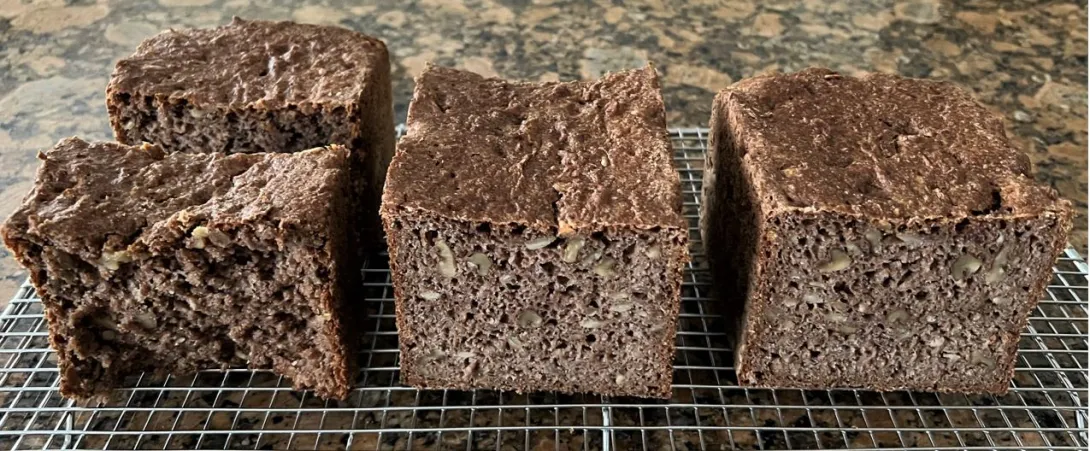
Valais Rye Walliserbrot (Switzerland) from The Rye Baker by Stanley Ginsberg
The latest new bake is a Walliserbrot courtesy of The Rye Baker by Stanley Ginsberg. I had to scale this one for a single large pan. Note to self, always use parchment paper on the bottom of the pan for ease of extracting the loaf. Another improvement would be to bake it maybe 5 mins less, the internal temp got a little above the recommended 198 F, I think due to the heating efficiency of the pan. Overall I am pleased with the outcome.
Tasting notes:
The crumb has a nice firm, slightly grainy texture that I enjoy. In addition the crumb has slight sour/fruity taste. The crust has a toasty taste with notes of malt.
For those who are interested the recipe and process are included below.
- CalBeachBaker's Blog
- Log in or register to post comments
Thanks for sharing this. I am super interested in his recipes. I having been playing with diastatic malt added to a scald and kept warm for 20 hrs to break down the carbs into sugars. It's from one of his recipes. I am amazed at all the preparation techniques that can pull out different flavours from grains... and then be integrated at the end.
Shape the dough into a loaf with a rounded top. Pile the dough up in the middle using a wet spatula or scraper. Flat tops tend to stay flat as the rye dough will rise straight up and then sink if slightly overproofed or the pan is too wide. I would also get the loaf into the oven about 15 minutes sooner.
Even crust colour all around so the oven temps and placement is perfect. It looks scrumptious!
Mini - thanks for the advise. I am finding that I really like rye breads. I'll be making this loaf again and will applying your suggestions.
Tony
I made a loaf of this bread a couple of months ago and it is, indeed, an outstanding bread! Even an independent taster that isn't a big fan of rye breads really liked this bread.
I noticed these kind of breads use fermentation for flavour but yeast for rise. Is it possible to do without the yeast or is there an issue with the dough slow-fermenting into gloop?
Hi Happycat,
According to Stanley’s book – ‘Most of the rye breads in this book are built on wild yeast (sourdough) sponges, which not only leaven the loaves but also carry out the necessary role of acidifying the dough against starch attack (see page 32). In many rye breads it’s the acid component of the sourdough that’s more important than the leavening component. In those instances the sour sponge can ferment for up to 16,18, even 20 hours, which weakens the yeast but greatly increases the acidity. To compensate for the loss of leavening power, rye bakers add a small amount of commercial yeast, a practice called “spiking” the dough.’
Tony
Thanks, that's what I thought. Starch attack is the amylase breaking down the starches... I didn't realize that sourdough acidity inhibited that. i've been playing with malting and mashing these past two weeks and I certainly have some challenges that I think are related to this issue.
A delicious bake Tony, I’d love to make this except I haven’t seen course rye meal anywhere, maybe I’ll find it someday.
Benny
Hi Benny,
I too could not find rye meal locally so I ordered some rye berries online and I used my trusty old Vitamix and it did a great job. A blender might also work if the berries were ground in small batches to fill the recipe.
Tony
Yupik sold through amazon has rye berries. I milled up a coarse rye meal (malted) using an electric spice mill this oast week.
Pulse for awhile, sift out flour, then optionally re-mill bran... repeat until you get the coarseness you want.
A true hand grinder is more consistent but it can be a bit hard on the hands and more time consuming.
I was in Valais in Sept & the roggenbrots I ate were always large boules rather than baked pullman-style. Also, none of the Walliser ryes I saw had nuts or seeds -- though, of course, there's nothing wrong with add-ins and some master bakers may include them.
Your bread looks mouth watering.